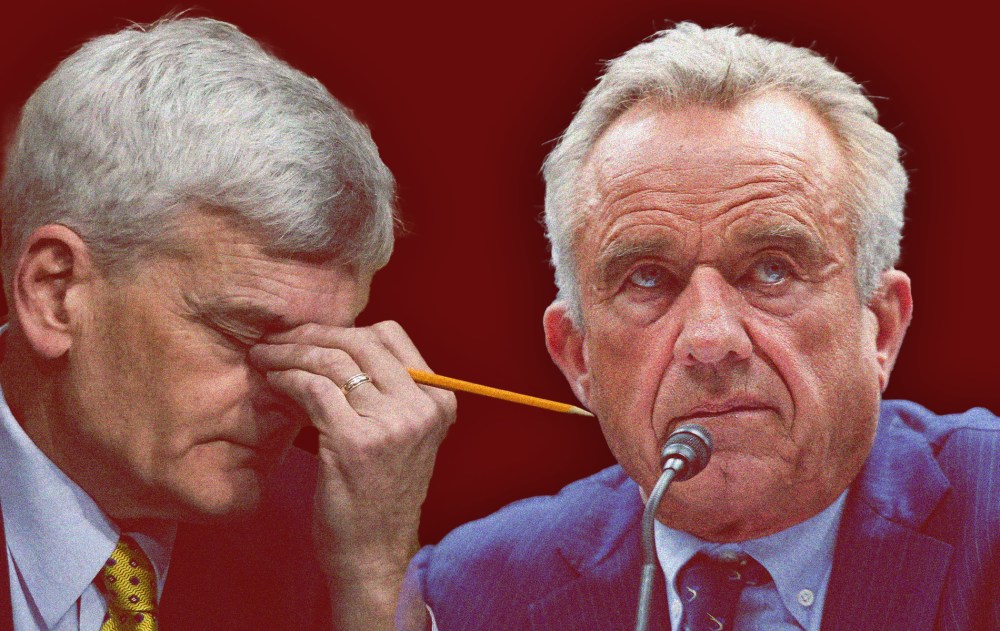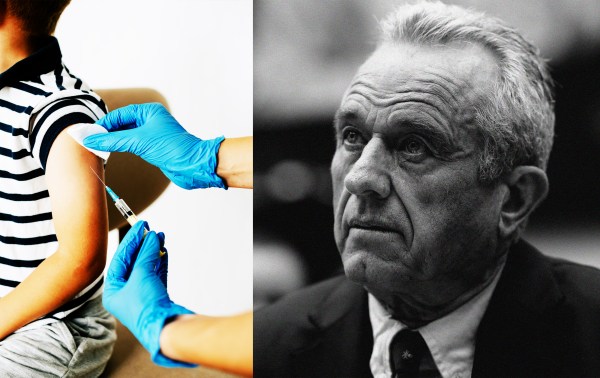Watching the media descend on Sen. Bill Cassidy this week, I thought of what Churchill said to Neville Chamberlain: “You were given the choice between war and dishonor. You chose dishonor, and you will have war.”
Cassidy, a medical doctor, chose dishonor when he voted to confirm Robert F. Kennedy Jr. to lead the Department of Health and Human Services. He understood better than his colleagues how dangerous it would be to give RFK Jr., an anti-vax nutbag of long standing, power to set health policy in the United States. But Cassidy is up for reelection and is already on thin ice among the Republican base for voting to convict Donald Trump at his impeachment trial after January 6. Opposing Kennedy, a favorite of grassroots cranks, would have amounted to declaring war on MAGA.
So he voted yes, the equivalent of an astrophysicist endorsing a flat-earther to lead NASA. Cassidy chose dishonor. And he will almost certainly have war.
Reporters were chasing him to get his thoughts after Kennedy purged all 17 members of the Advisory Committee on Immunization Practices (ACIP), the expert panel that advises the CDC on which Americans should receive particular vaccines and how often. In February the senator promised to “carefully watch for any effort to wrongfully sow public fear about vaccines” by the new secretary and boasted of “assurances” made to him by RFK Jr. that no such thing would happen. Those assurances turned out to be worth about as much as the ones given to Chamberlain at Munich.
As news of the purge spread, Cassidy all but admitted to being a schnook who’d been had. “Of course, now the fear is that the ACIP will be filled up with people who know nothing about vaccines except suspicion,” he lamely observed on Twitter, adding that he’d just spoken with Kennedy about the matter. That’s what triggered the press, which surrounded him in the Capitol eager to know how the conversation had gone. “I’d rather just characterize it as: We had a conversation,” the senator replied tersely. That bad, huh?
When asked if he was still comfortable with his vote to confirm RFK, Cassidy had no comment.
Superficially the ACIP purge resembles other dramatic bull-in-a-china-shop “reform” initiatives of the Trump administration, like setting DOGE loose on the federal bureaucracy or declaring a trade war on the whole world at once. As you may have noticed, that “move fast and break things” approach tends not to work so well in practice. The "Liberation Day" tariffs were quickly placed on hiatus, probably indefinitely, while DOGE’s spending cuts may well end up achieving less than nothing.
But that’s the wrong way to understand what Kennedy is trying to do with ACIP, I think. He’s not smashing the panel impetuously, without regard to unintended consequences. He’s playing the long game. He means to reduce both the supply of, and demand for, vaccines in the United States and he’s going about it in a perfectly rational way.
If Bill Cassidy doesn’t regret his confirmation vote yet, he will soon.
Fig leaves.
On Wednesday Kennedy named eight new members to ACIP. Interestingly, and cleverly, not all of them are cranks.
An all-crank panel would have been easy for scientists to discredit. Already there’s been loose talk among vaccine experts about creating an alternative to ACIP to provide the public with responsible guidance in the absence of qualified federal leadership. The fact that Kennedy’s new panel includes a few respected doctors will make the need for that alternative harder to justify.
At least one well-known scientist, epidemiologist Michael Mina of Harvard, even sounds mildly impressed by the composition of the new panel. Sure, it now includes Dr. Robert Malone, who helped develop mRNA technology before becoming InfoWars darling for his claims about elites exploiting the pandemic to bring about global communism. And yes, it includes nurse Vicky Pebsworth, who’s on the board of an organization that was founded “to promote awareness of the risks of vaccination.” But five of the other six seem like reasonably good choices, Mina maintains.
I hope so, but there’s a whiff of schnookery in that optimism.
For one thing, Kennedy probably isn’t done making appointments. If he intends to replace all 17 members, he still has more than half of their seats to fill. For another, some of the supposedly encouraging picks don’t seem all that encouraging to my untrained eye. “No reason to think anything but a good choice,” Mina writes of MIT professor Retsef Levi. That’s the same Retsef Levi who declared in 2023, “The evidence is mounting and indisputable that mRNA vaccines cause serious harm including death, especially among young people. We have to stop giving them immediately!”
In fact, only one of the eight new members is a “legitimate vaccinologist” according to an expert in vaccine law who debriefed the New York Times. Three more are respected physicians but have no expertise in vaccination or immunology. I suspect RFK Jr. assumes, or hopes, that those doctors will either be bulldozed by the likes of Malone and Pebsworth into ambivalence toward vaccines or that they’ll simply be voted down by the panel’s eventual anti-vax majority. The “real” doctors are there to provide a fig leaf of legitimacy to an illegitimate project.
One expert interviewed by the Times cheekily described Malone’s appointment as “a political move to maintain support of some Americans and demonstrate diversity, equity and inclusivity,” but I fear it’s just the opposite. It’s the sane people on the panel who are DEI hires, a sop by Kennedy to the Bill Cassidys of the world. He surely didn’t purge America’s most influential vaccine advisory board, fulfilling one of his highest political ambitions, only to turn around and reconstitute it basically as it was before with a few token nuts thrown in to mollify MAGA.
Arguably the surest way to reduce vaccine uptake in America is to convert ACIP into a platform for anti-vaxxers. Why on earth would Robert F. Kennedy Jr. not seize the opportunity?
Diminished supply.
ACIP has enormous influence over the supply of vaccines in the United States. And elsewhere.
Insurance companies, including government insurers like Medicaid, are required to cover vaccinations that the panel recommends. If the panel stops making those recommendations, those insurers might stop paying for shots. If they stop paying for shots, only those who can cover the cost themselves—and are willing to do so—will have access.
There are lots of things that well-off people have access to that less well-off people don’t, of course, but vaccines aren’t any ol’ product. Should the immunization rate across the population fall below what’s needed for herd immunity, we have a serious national problem.
Liability is another issue. After news of the ACIP purge broke, Democratic Rep. Jake Auchincloss speculated that Kennedy will soon “move to add autism, or other conditions, to the table of injuries for the Vaccine Injury Compensation Program.” Any such compensation would be paid by HHS, but if I were a vaccine manufacturer I’d worry that Republicans might change the law to make pharmaceutical companies directly liable for immunization injuries like, ahem, autism. Even if the companies ended up prevailing in court, they’d potentially be facing a lot of litigation.
Some might look at all that and conclude that it’s cheaper to simply stop offering certain vaccines in the U.S. Once that happens, with the lucrative American market no longer viable, the entire global supply would be at risk. “The U.S. market has a big impact on what vaccine manufacturers are actually going to make and manufacture,” virologist Angela Rasmussen warned the Associated Press. If a company can’t sell its product here, making the product might not be financially viable.
A few days ago the Wall Street Journal accused Kennedy of nothing less than trying “to eliminate incentives to develop vaccines,” which sounds like hyperbole but is actually a straightforward potential consequence of transforming ACIP. It’s part of a pattern: Two weeks ago Trump’s administration canceled a $600 million contract with Moderna, one of the pioneers of the COVID shot, to develop a mRNA inoculation for bird flu. The danger of a pandemic from that disease is clear and present, but populist paranoia on the right about mRNA technology is so febrile that several red states have moved to ban vaccines that rely on it altogether. (So much for “medical freedom.”) Moderna’s incentive to develop a much-needed bird-flu immunization is obviously weaker now than it was before.
Despite his ostensible turn to the right, Robert F. Kennedy Jr. remains a good Democrat at heart and understands that the surest way to kill some productive economic activity is to smother it with regulation. That’s the tacit mission statement of the new ACIP. It’s going to choke off the supply of vaccines by doing its best to make production cost-prohibitive.
Diminished demand.
It’s going to choke off demand too. Here again, Michael Mina is more of an optimist than I am.
Much more. Having a few kooks on the panel, he writes, might “bring—dare I say the D word—Diversity—to the group that could ironically enable ACIP to better understand and be aware of the complex ecosystem that drives vaccine hesitancy and perhaps help the other six [members] to be educated on the odd conspiracies and pseudo-science that drive vaccine hesitancy.”
You need to have a very sunny view of human nature to believe that putting more anti-vaxxers in positions of authority will increase vaccine uptake long-term among Americans, which is what Mina seems to be imagining. Forgive me for thinking that listening to Robert Malone babble about global communism won’t do much to help ACIP craft messages capable of winning over people who use the word “plandemic” unironically and believe Bill Gates wants to put microchips in their bloodstream.
A better argument would be that having well-known kooks chiming in during ACIP meetings should give vaccine skeptics confidence that any shots that are ultimately approved must be safe. With trusted figures like Malone and Pebsworth consulting, populists can rest assured that any thumbs-up from the panel must be well deserved. In theory.
But that’s not the way populism works. Ask Dan Bongino.
Bongino is playing the same role at the FBI that Malone might conceivably play at ACIP. He went from being a darling of the grassroots right to deputy director of the agency that represents the beating heart of the “deep state.” And so when he announced that he’s looked at Jeffrey Epstein’s file and has no doubt that Epstein killed himself, one might have assumed that the trust he earned during his previous life as a pro-Trump podcaster would ease right-wing conspiracy theories about how Epstein really died.
That is, uh, not what happened. On the contrary, well-known populist sites are now accusing him of being a “hostage of the deep state.” Bongino has begun to sound like a broken man in interviews, having discovered belatedly that the years he spent seemingly building credibility among the paranoid right couldn’t survive first contact with challenging their paranoia. You can’t reason a person out of a position that he wasn’t reasoned into; Robert Malone will find that out the hard way, like Bongino did, if and when he votes to authorize any new vaccines.
And so the new ACIP isn’t going to do anything to improve vaccine uptake among the population. What it’s actually going to do is reduce demand and destroy trust on all sides.
Every time the panel votes to restrict certain vaccines, it’ll encourage stalwart anti-vaxxers to double down on their beliefs and cause ambivalent Americans to wonder if immunization isn’t as safe as they’d been told for most of their lives. Pro-vaxxers, meanwhile, will call the panel a catspaw for cranks and insist that no finding from a health bureaucracy run by Robert F. Kennedy Jr. can ever be taken seriously, which will complicate public acceptance when (if?) the panel does recommend certain vaccinations.
Maybe the “alternative” ACIP I mentioned earlier will get off the ground, causing a schism in which half the country gets its vaccination guidance from one authority and the other half gets it from another. And then, when the White House eventually switches hands down the road, things will get worse. “Democrats aren’t going to simply keep the likes of Robert Malone on the ACIP once they retake power,” Andrew Egger explained today at The Bulwark. “And when they do boot him and others, it will only radicalize Republicans further, crystalizing the notion that vaccine science is just yet another zero-sum battle line in the endless left-right culture war.”
Demand for vaccines on the right, including among many independents, will decline rapidly. It might even dip among the left as low-information Democrats end up confused when competing authorities clash over whether particular vaccines are safe or not.
All of which points to a perfect result for RFK: Reducing the number of Americans who are willing to protect themselves from deadly diseases is, after all, his life’s work.
A dangerous country.
The United States is becoming a dangerous country.
It’s been dangerous to rogue states abroad for the better part of a century, of course, although less so at the moment than at any point since 1941. What I mean is dangerous to its own citizens and allies.
To be a friend of the United States is to be menaced, threatened, or ignored. To be a citizen is to worry about soldiers policing your city, immigration agents detaining you mistakenly, and the president threatening you if you protest him. The business you’ve spent your life building might be crushed at a moment’s notice because that’s just the way things work now.
Policy is set so stupidly, chaotically, and unpredictably that some nations have felt obliged to issue travel advisories for their own citizens urging them to be careful when visiting. We’re no longer a stable country, and it’s so glaringly apparent to the rest of the planet that Chinese totalitarianism has begun to seem appealing by comparison.
That’s the proper lens through which to view Kennedy’s ACIP purge. A dangerous country will also endanger its citizens’ health needlessly, for the most idiotic reasons. Americans wanted to be governed by a populist kakistocracy populated by a truly rich variety of lunatics; inevitably that lunacy would leach into matters as basic as trying to discourage you from immunizing your baby against measles.
The important takeaway from all this isn’t that more Americans will die of preventable diseases in the future, although they will. The takeaway is that Americans chose that outcome. They knew, or should have known, what they were getting. That’s obviously not a people that’s fit to lead the world, which is why global polling on China is what it is.
Too many chose dishonor. At least Bill Cassidy has the excuse that he did so to avoid war, or its political equivalent. Most chose to hand America’s scientific legacy over to witch doctors and dimwit paranoiacs for nothing grander than cheaper eggs.







Please note that we at The Dispatch hold ourselves, our work, and our commenters to a higher standard than other places on the internet. We welcome comments that foster genuine debate or discussion—including comments critical of us or our work—but responses that include ad hominem attacks on fellow Dispatch members or are intended to stoke fear and anger may be moderated.
With your membership, you only have the ability to comment on The Morning Dispatch articles. Consider upgrading to join the conversation everywhere.